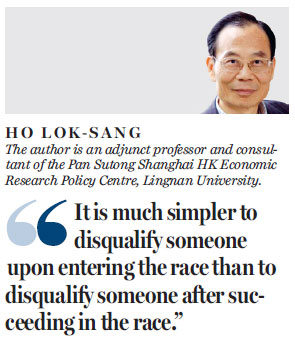Respecting Basic Law paramount
Updated: 2016-07-19 07:21
By Ho Lok-sang(HK Edition)
|
|||||||
Ho Lok-sang says that recent proposal for contestants for LegCo seats to sign a declaration to uphold certain key clauses in the Basic Law is legal and sensible
Back in 2013, during the consultation about the electoral reform package in preparation for the Chief Executive election, I had proposed that contestants sign a pledge to respect the Basic Law and the Constitution of the People's Republic of China. The recent proposal for contestants for Legislative Council seats to sign a declaration to uphold certain key clauses in the Basic Law, including that Hong Kong is an inalienable part of China, follows the same principle. Anyone making a false declaration on the nomination form is liable to criminal sanction. Some legislators and aspiring contestants for the LegCo seats called the requirement illegal and amounting to political repression. In fact, the proposed requirement is entirely legal and, contrary to being political repression, helps foster trust.

First of all, LegCo is part of the establishment. LegCo of course is not part of the executive branch of the government, but it nonetheless helps further the public interest, which is exactly the goal of the government. The judiciary, the legislative and the executive functions of the government are all part of the establishment. Recently, Wang Guangya, director of the Hong Kong and Macao Affairs Office of the State Council, surprised many when he said, "From the perspective of the Basic Law, they ("pan-democrats") are also part of the establishment." To one who understands the Basic Law and knows the history of the Hong Kong government, this view is entirely understandable. Many people say that an important role of legislators is to monitor what the government does and check against possible power abuse or miscarriage of policy. Actually that role is rather to monitor what the executive branch of the government does, because LegCo is part of the government. Even the website of LegCo (www.legco.gov.hk) shows that status.
Second, the Hong Kong SAR was established by the National People's Congress (NPC) under Article 31 of the Constitution. It was the NPC that enacted the Basic Law, and it was the NPC that conferred upon the SAR its executive, legislative and judicial powers. Anyone who wants to serve on LegCo must therefore intend to serve in a capacity defined by the Basic Law. It is therefore entirely logical that aspiring LegCo members should uphold the Basic Law. Unless the Basic Law has been changed according to the rules and procedures, it should be in force, and all other laws of the land should give way to the Basic Law in the event of contradiction.
By solemnly signing a declaration to the effect that they will uphold the Basic Law, contestants for LegCo seats tell the public that their motives are genuine - to serve the public in the role of LegCo members of the HKSAR Government.
Some legislators argue that the declaration is superfluous. It was pointed out that there are already provisions for elected legislators to declare that they will uphold the Basic Law and that their allegiance is with the SAR government before they assume their duties.
Unfortunately, it is now well-known that some aspiring contestants for LegCo seats have openly advocated Hong Kong's independence from China. These people, if elected, would upon appointment still have to make the declaration at that point. The embarrassing fact is that these people openly defy the Basic Law. If they make a declaration, everybody knows it is disingenuous. It will make a mockery of the declaration.
Some people say that if they are dishonest and act in ways that contradict the Basic Law as legislators, they will then have a political price to pay. But what is the political price to pay for them? To me, the political price could point the other way: The government will have a political price to pay at that point to terminate their tenure as legislators.
To me, then, it is entirely clear that as long as the Electoral Affairs Commission acts according to the spirit of the Basic Law as the regulator of election affairs, it does have the legal power to ensure that candidates understand the Basic Law and intend to uphold it. It is much simpler to disqualify someone upon entering the race than to disqualify someone after succeeding in the race.
To someone who queries the legality of the proposed rules, I would say that the Basic Law is paramount. Honesty is paramount; so too is integrity. It is disingenuous of legislators to say that they will not sign the declaration because they will make the declaration upon election any way. Asking candidates to sign the declaration and telling them in advance that there are consequences for violating the declaration is wise.
(HK Edition 07/19/2016 page10)